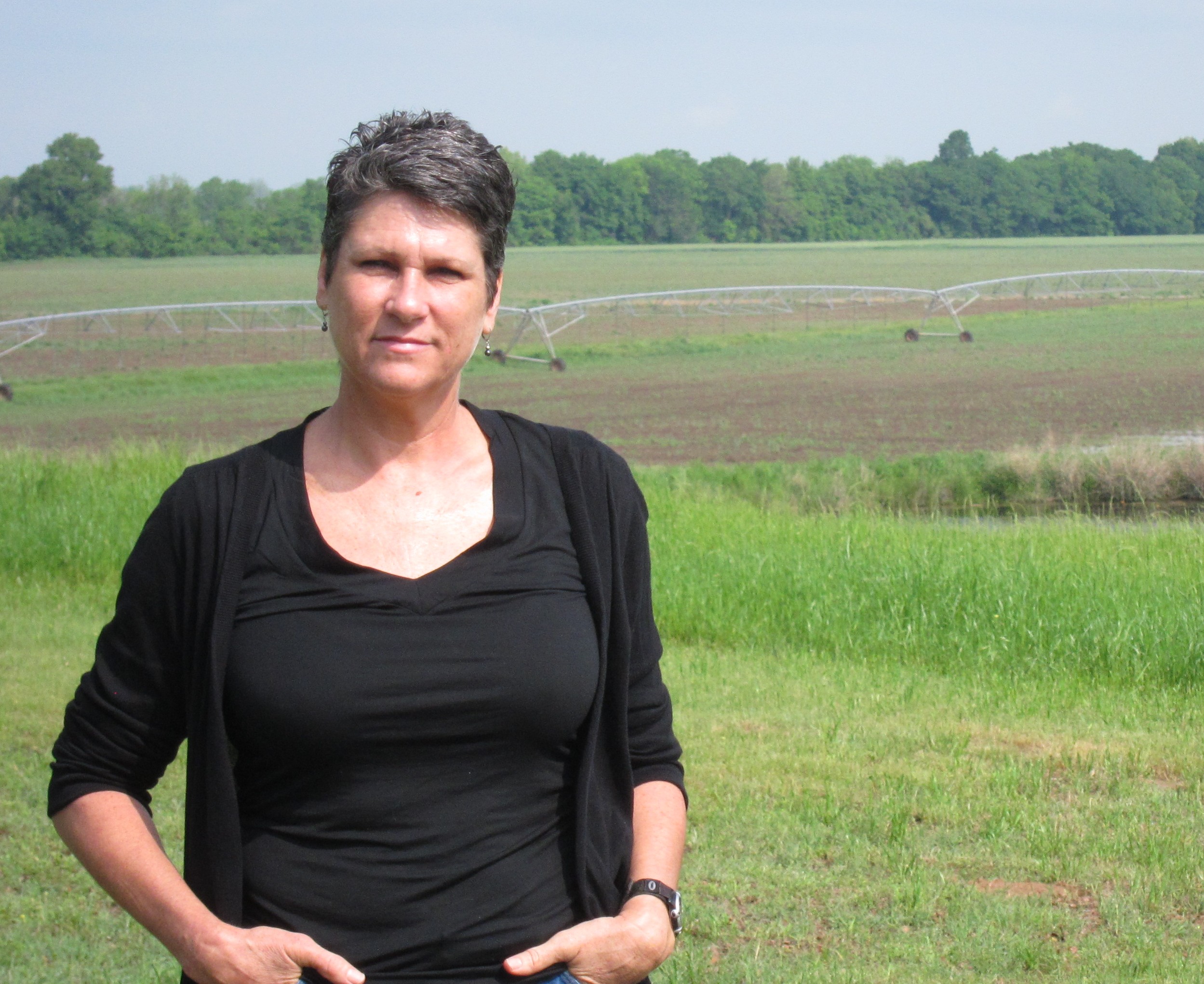Eminent Domain Comes to the Texas Legislature
 When supporters of the Keystone XL pipeline said it would bring jobs to Texas, they probably weren’t talking about jobs for lawyers.
When supporters of the Keystone XL pipeline said it would bring jobs to Texas, they probably weren’t talking about jobs for lawyers.
That’s just kind of how it worked out.
As property owners challenge the company’s use of eminent domain, the project to bring crude from the Canadian tar sands to refineries on the Texas Gulf sparked litigation all down the line. One of those property owners is Julia Trigg Crawford. She’s a farmer from North Texas who says it was too easy for the company to take her land.

Photo by Terrence Henry
Julia Trigg Crawford has been in an extended legal battle with the TransCanada pipeline company.
“The way TransCanada got to that stage is, they went to the Railroad Commission [which regulates drilling and pipelines in the state], they got the T4 form,” Crawford told StateImpact Texas, “and when they got to the box that asked if you’re a common carrier or a private carrier they checked the common carrier box.”
To be a “common carrier” means that the pipeline can be hired out by whatever entity can afford to use it, kind of like a toll road. To claim common carrier status gives the company the right to take land under state law. But in 2011, the Texas Supreme Court ruled that pipeline builders need to do more than check a box to get that power. Now, three bills at the state capital aim to overhaul the system.
Meet the Bills
First up, House Bill 2748 from Rep. Tryon Lewis, R-Odessa. It calls for a notice, a hearing and an opportunity to appeal before a company is able to take land as a “common carrier.”
Tom “Smitty” Smith is the head of Texas Public Citizen, an environmental group that has opposed pipeline companies. He told StateImpact Texas that Lewis’ bill has all the trappings of a “shell bill,” a bill filed with few details so that lawmakers, stakeholders, agency officials, and lobbyists, can figure out the details during the legislative process.

Photo Courtesy of Texas Legislature
Rep. Tryon Lewis (R-Odessa) has filed a bill to overhaul how pipeline companies claim the right to take land in Texas.
“What he did was he took the standards enumerated by the Texas Supreme Court for what should occur before a condemnation is authorized, [and] dropped them in his bill,” said Smith, “and didn’t say very much more than that.”
Lewis was unavailable for comment for this article.
The bill does have the support of some industry groups. James Mann is a lawyer for the Texas Pipeline Association. He likes it because it could mean that a single pipeline can’t be taken to court over and over for its use of eminent domain. With Texas in the midst of a historic oil and gas boom, he says that certainty is a bonus for the industry.
“Give people a chance to litigate it if they want to,” Mann told StateImpact Texas, “but just do it once.”
The bill also appears to keep the decision of who gets common carrier status in the hands of the Railroad Commission. Mann says that’s important because the Railroad Commission is the state agency that regulates pipelines.
It’s a sentiment shared by the TransCanada pipeline company, which also appears to favor a hearing at the Railroad Commission.
“We welcome a process that’s transparent, where the Railroad Commission can determine if someone’s a common carrier or not,” Corey Goulet, Vice President of the Keystone Pipeline Project, told StateImpact Texas.
Others would like to see the decision over which pipeline is a common carrier out of the hands of the Railroad Commission altogether.
Undue Influence

Photo Courtesy of the Texas State Legislature.
State Rep Rene Oliveira has filed legislation that would put common carrier hearings at the State Office of Administrative Hearings.
State Rep. Rene Oliveira, D-Brownsville, points out that the elected leaders of the Railroad Commission are as susceptible to pressure from industry donors as any other elected officials, perhaps even more so.
“It’s even worse for the Railroad Commission because they have isolated industries that are going to be contributing heavily to their campaigns, and they don’t have any other campaign base,” he told StateImpact Texas.
In fact, a Sunset Review of the Railroad Commission recently recommended that campaign contributions to commissioners be regulated to avoid the appearance of undue industry influence. So Oliviera’s House Bill 3547 puts the decision over common carrier status in the hands of the State Office of Administrative Hearings.
“These are independent judges, they rule for and against the state of Texas, they rule for and against parties, and we can deal with that in a quick and efficient way,” he said.
Oliveira says it’s a move that should find support among landowner groups and agricultural interests. When asked, both Julia Trigg Crawford and Public Citizen’s Smith said they supported the move.
The State Office of Administrative Hearings also makes its way into Senate Bill 1625.
That bill, authored by State Senator Wendy Davis, D-Fort Worth, also goes into detail over what information a pipeline company needs to provide in its application. Things like the names of the pipeline’s customers, what it will transport, and how much.
A Long Process
Back at her farm in North Texas, Julia Trigg Crawford says she sees some good and some bad in the bills. She likes a stipulation in Oliveira’s bill that says if a pipeline is a “common carrier,” it must hire out at least ten percent of what it carries to companies that do not own the pipeline. She worries about some of the language in Davis’ bill, but likes the fact that it mandates more information from pipeline companies.
“These are all the things that a lot of us feel that TransCanada did not have to provide. They just had to go check a box,” she said.
None of the bills will likely impact her situation, though. She just filed an appeal of a lower court ruling in her case against TransCanada last week.
“The appeals process is a long process,” she said over the phone.

